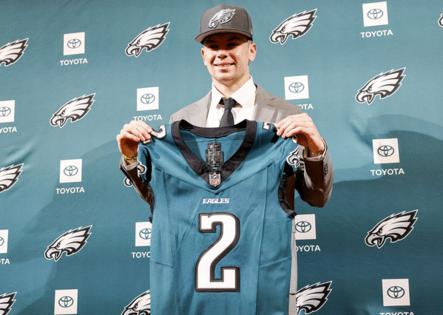Cornerback, safety or both? Cooper DeJean doesn't care about labels. The new Eagle just wants to play
Published in Football
PHILADELPHIA — Cooper DeJean wanted to play quarterback in college.
If he had lived anywhere other than Iowa, he might have pursued that goal. But DeJean knew that his likely best path to success, and possibly the NFL, was playing defensive back for his home state Hawkeyes.
"I think it was tough at the time," Jason DeJean said of his son choosing Iowa over offers to play quarterback at smaller programs. "But with Phil Parker being the defensive coordinator there and being a defensive backs specialist ... he called us and said, 'I'll have him for three years and he'll go to the NFL.'
"So he saw something in him that even we didn't see right away."
Parker, of course, would be proven right. After three seasons in Iowa City, DeJean is in the NFL after the Eagles selected him 40th overall in the second round of the draft on Friday. He joins a long list of Hawkeyes defensive backs who played under Parker in the last 25 years and went on to be drafted.
DeJean might have slipped out of the first round, where some analysts predicted he'd be taken, but he still became the highest drafted Iowa defensive back since 1997, when the Cardinals made Tom Knight the ninth overall selection.
Knight was used strictly as an outside cornerback, but DeJean's future position remains unknown. He, too, played mostly near the boundary in college, but some NFL evaluators view him as a safety, or more likely a hybrid who can play multiple spots in the secondary.
The Eagles publicly declined to pigeonhole DeJean at this stage.
"I think whatever he does he's going to do at a high level," general manager Howie Roseman said late Friday night. "Obviously we'll get him in here, and like everything else on this team, see how the pieces fit when Coach [Nick Sirianni] and his staff get their hands on these guys."
DeJean said that he embraces his versatility. In some corners of the NFL — but not as much as in years past — mastering many trades instead of one could be viewed as a strike against a prospect. But in the modern game, with passing predominant, defenses increasingly need adaptable pieces in the secondary.
...continued
©2024 The Philadelphia Inquirer, LLC. Visit at inquirer.com. Distributed by Tribune Content Agency, LLC.







Comments